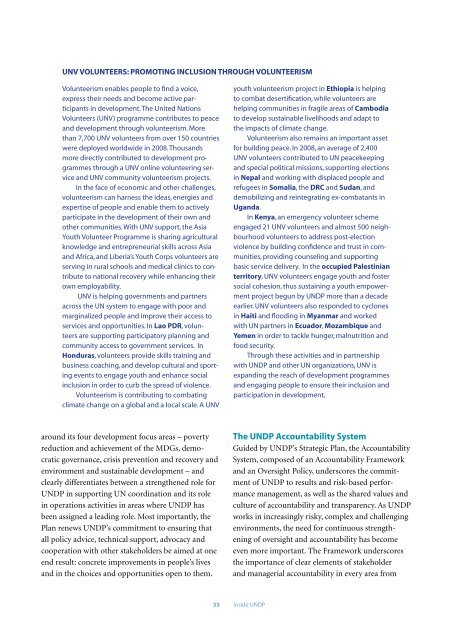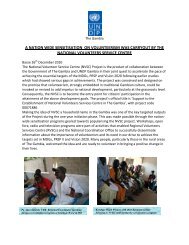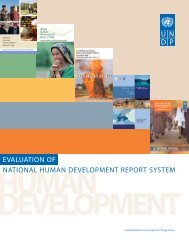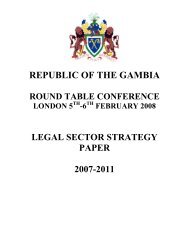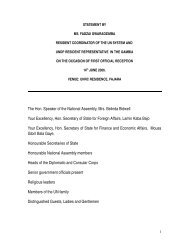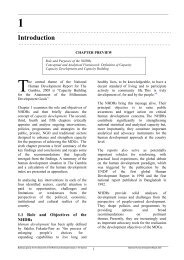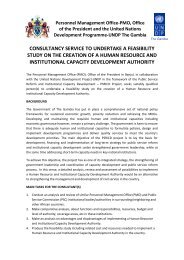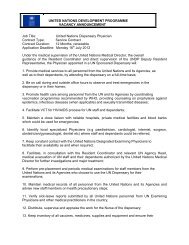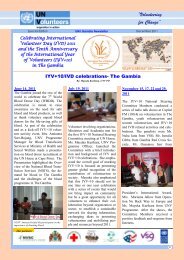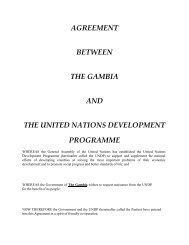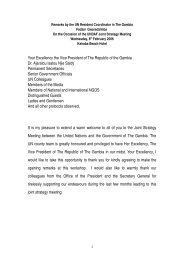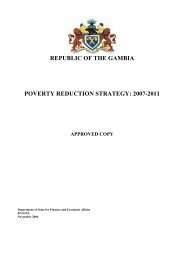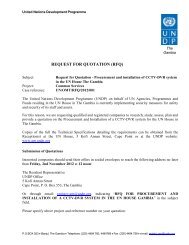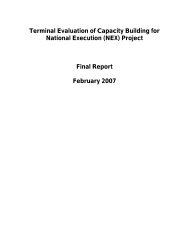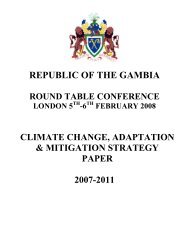Annual Report 2009 - United Nations Development Programme
Annual Report 2009 - United Nations Development Programme
Annual Report 2009 - United Nations Development Programme
You also want an ePaper? Increase the reach of your titles
YUMPU automatically turns print PDFs into web optimized ePapers that Google loves.
UNV Volunteers: Promoting inclusion through volunteerism<br />
Volunteerism enables people to find a voice,<br />
express their needs and become active participants<br />
in development. The <strong>United</strong> <strong>Nations</strong><br />
Volunteers (UNV) programme contributes to peace<br />
and development through volunteerism. More<br />
than 7,700 UNV volunteers from over 150 countries<br />
were deployed worldwide in 2008. Thousands<br />
more directly contributed to development programmes<br />
through a UNV online volunteering service<br />
and UNV community volunteerism projects.<br />
In the face of economic and other challenges,<br />
volunteerism can harness the ideas, energies and<br />
expertise of people and enable them to actively<br />
participate in the development of their own and<br />
other communities. With UNV support, the Asia<br />
Youth Volunteer <strong>Programme</strong> is sharing agricultural<br />
knowledge and entrepreneurial skills across Asia<br />
and Africa, and Liberia’s Youth Corps volunteers are<br />
serving in rural schools and medical clinics to contribute<br />
to national recovery while enhancing their<br />
own employability.<br />
UNV is helping governments and partners<br />
across the UN system to engage with poor and<br />
marginalized people and improve their access to<br />
services and opportunities. In Lao PDR, volunteers<br />
are supporting participatory planning and<br />
community access to government services. In<br />
Honduras, volunteers provide skills training and<br />
business coaching, and develop cultural and sporting<br />
events to engage youth and enhance social<br />
inclusion in order to curb the spread of violence.<br />
Volunteerism is contributing to combating<br />
climate change on a global and a local scale. A UNV<br />
youth volunteerism project in Ethiopia is helping<br />
to combat desertification, while volunteers are<br />
helping communities in fragile areas of Cambodia<br />
to develop sustainable livelihoods and adapt to<br />
the impacts of climate change.<br />
Volunteerism also remains an important asset<br />
for building peace. In 2008, an average of 2,400<br />
UNV volunteers contributed to UN peacekeeping<br />
and special political missions, supporting elections<br />
in Nepal and working with displaced people and<br />
refugees in Somalia, the DRC and Sudan, and<br />
demobilizing and reintegrating ex-combatants in<br />
Uganda.<br />
In Kenya, an emergency volunteer scheme<br />
engaged 21 UNV volunteers and almost 500 neighbourhood<br />
volunteers to address post-election<br />
violence by building confidence and trust in communities,<br />
providing counseling and supporting<br />
basic service delivery. In the occupied Palestinian<br />
territory, UNV volunteers engage youth and foster<br />
social cohesion, thus sustaining a youth empowerment<br />
project begun by UNDP more than a decade<br />
earlier. UNV volunteers also responded to cyclones<br />
in Haiti and flooding in Myanmar and worked<br />
with UN partners in Ecuador, Mozambique and<br />
Yemen in order to tackle hunger, malnutrition and<br />
food security.<br />
Through these activities and in partnership<br />
with UNDP and other UN organizations, UNV is<br />
expanding the reach of development programmes<br />
and engaging people to ensure their inclusion and<br />
participation in development.<br />
around its four development focus areas – poverty<br />
reduction and achievement of the MDGs, democratic<br />
governance, crisis prevention and recovery and<br />
environment and sustainable development – and<br />
clearly differentiates between a strengthened role for<br />
UNDP in supporting UN coordination and its role<br />
in operations activities in areas where UNDP has<br />
been assigned a leading role. Most importantly, the<br />
Plan renews UNDP’s commitment to ensuring that<br />
all policy advice, technical support, advocacy and<br />
cooperation with other stakeholders be aimed at one<br />
end result: concrete improvements in people’s lives<br />
and in the choices and opportunities open to them.<br />
The UNDP Accountability System<br />
Guided by UNDP’s Strategic Plan, the Accountability<br />
System, composed of an Accountability Framework<br />
and an Oversight Policy, underscores the commitment<br />
of UNDP to results and risk-based performance<br />
management, as well as the shared values and<br />
culture of accountability and transparency. As UNDP<br />
works in increasingly risky, complex and challenging<br />
environments, the need for continuous strengthening<br />
of oversight and accountability has become<br />
even more important. The Framework underscores<br />
the importance of clear elements of stakeholder<br />
and managerial accountability in every area from<br />
35 Inside UNDP


